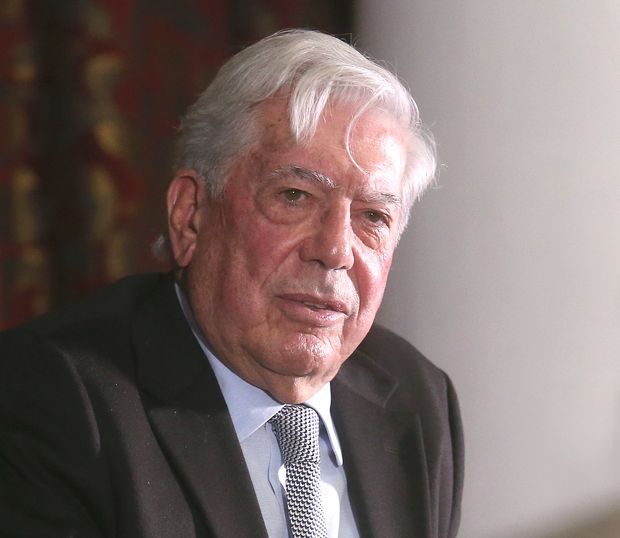Peruvian Nobel Prize winner meets with Ukrainian readers

KYIV – Last week Taras Shevchenko National University hosted a meeting with Jorge Mario Pedro Vargas Llosa, 1st Marquis of Vargas Llosa, Peruvian writer, politician, journalist, essayist, college professor, and recipient of the 2010 Nobel Prize in Literature. This event came as a surprise for the Ukrainian capital’s reading public. It hadn’t been advertised by the main channels, but the university’s Red Building’s conference hall was packed.
Mr. Llosa had the meeting in a public interview format, with most questions from the audience being essentially statements of admiration of his literary heritage. There was also a hair-raising story about a woman who died holding one of his books. The 78-year-old celebrity got the situation under control and concentrated on general questions.
He couldn’t avoid discussing what’s happening in Ukraine, of course: “Ukraine is fighing for its European choice, for the right to take part in this European project, this first ‘realistic utopia,’ if you will pardon my saying so. It is rooted in the ideals of liberty… It is very important for your country to win this battle against Putin’s imperialistic, colonial policy. Events in Ukraine have recharged the European intelligentsia with enthusiasm, something they were lacking. These intellectuals now stand hand in hand with your country. Ukraine is being watched by the entire civilized world. Regrettably, not all of the EU member countries are taking a sufficiently principled stand, so this is our moral obligation to pressure them with our public opinion. They are hesitant, but it is high time they said ‘We’ve had enough!’”
Mr. Llosa dwelt on literature, especially on life stories. Talking about the author’s concept and how the end result could be received by the reader, he said, with his innate sense of humor: “After my first novel, La ciudad y los perros (literally “The City and the Dogs” 1963/1966, known in the English-speaking world as The Time of the Hero), I had an opportunity to discuss it with a French author whom I held in esteem. He said he liked the way my hero, Jaguar, took responsibility for a murder he’d never committed, adding that it was a good literary technique. I said wait a sec, the man did commit that murder. He said of course not, it’s just that you don’t understand the plot. Plato said that the poet doesn’t know what he’s writing about.”
He was very careful about discussing the mission and functions of literature: “We must thank our literature for allowing us to live our way of life, allowing us to solve mysteries, sustain our adventures, adding to our life experience, and allowing us to learn something we’d have never learned in our daily life… Civilization is following literature as its shadow, and literature helps us make changes for the better, with its diversity of themes, comprehensive approaches, ambiguous statements… literature brings us freedom, so it constitutes a clear and present danger for an authoritarian regime, for the dictator. That was why they always practiced censorship. Literature protects freedom and reveals things those [‘upstairs’] want to keep secret. One can visualize a dictatorship that can coexist with literature, but no good writer would coexist with that dictatorship!”
Mr. Llosa doesn’t think that literature should serve to change the world – rather, it brings up certain issues, problems, and criticizes the existing realities: “The plot often differs from the author’s views and public stand. Writing a book, you rely on your creative intuition and it often proves to be more accurate, as was the case with the Marxist writer, Berthold Brecht, who came up with many universal truths despite his persuasions. Or take the conformist, even anti-Semitic Honore de Balzac who in his writings consistently criticized corruption, social inequality, injustice, and lawlessness.”
When asked about Peru, Latin America, and Spain (where he is residing, feeling “Latin American, Peruvian, and a citizen of the world at the same time”), Mr. Llosa became expressly critical, saying one of the biggest problem is bullfighting and the possibility of banning it: “I’m against banning it in principle because it is an art and sport. It has something to do with dancing, and fine arts… It is a source of inspiration for a creative personality. Can you imagine Goya or Picasso without bullfighting scenes? Banning it would be an encroachment on culture, killing the bulls that live only because they are meant for it.”
When asked about Catalonia and its independence, he said: “I love Catalonia. I stayed there long enough to realize that no one was for its autonomy, but after it had its autonomy, with all the privileges, after Franco, the nationalistic movement had gained momentum. This is a clear and present danger. There is a freedom with no restrictions for all kinds of historical falsehood, with the local administration trying to picture Catalonia as a colony of Spain. Catalonia has never been separate or independent! It was part of the Kingdom of Aragon that effectively coexisted with the Spanish government. Catalonia remained part and parcel of Spain for three hundred years. Under the Franco regime, all restrictions on Catalonian culture and language made no sense whatsoever. All this is history. Spain today is scared to be viewed by the international community as an undemocratic country, so the government is hard put to deal with the Catalonian nationalist movement.”
God only knows what will happen to Catalonia or who will win the separatists vs. Spanish World dispute. One thing is clear: Mr. Llosa’s impassioned statement reminds us of our politicians’ rhetoric we’ve been hearing for several decades. Also, this was what made the meeting with him so interesting and informative. We saw and heard the man, and he may have helped us figure out some of the controversies of his and our realities.






